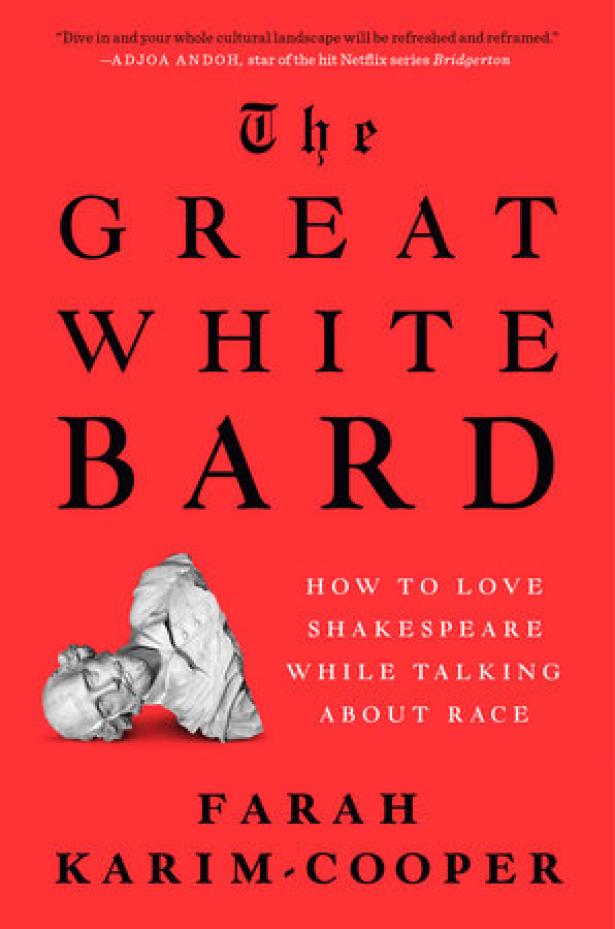The Great White Bard
Farah Karim-Cooper
Viking
ISBN 9780593489376
Was my relationship to Shakespeare and race in need of a reality check?
I asked myself that question as I did the 50-yard dash to catch the G train for a rehearsal of “Hamlet,” clutching in my hand a copy of “The Great White Bard: How to Love Shakespeare While Talking About Race,” by Farah Karim-Cooper. The book takes a necessary look under the hood of the plays, delving into the Elizabethan and Renaissance ideals of race and how Shakespeare helped shape and define them. “Instead of worshiping his words,” Karim-Cooper writes, interrogating them “allows us to confront crucial questions of our day.”
As a Black actor who has had the chance to play many of the plum Shakespearean roles, had I been looking at his work through rose-colored glasses? Of course I knew there was racism in Shakespeare, but to what extent? This question is top of mind in drama schools and theaters of late, with Shakespeare’s relevance at stake. I know because I’ve been brought to campuses to discuss it.
So this summer I made “The Great White Bard” my trusted, troubling and fascinating companion on train rides, during rehearsal breaks, in dressing rooms and backstage, while working on Shakespeare’s greatest play on arguably New York’s greatest stage, the Delacorte Theater in Central Park.
Karim-Cooper, a director of education at Shakespeare’s Globe theater and a professor at King’s College London, is not merely analyzing from a distance; she’s an eyewitness on the front lines. Since 2018 she has helped put together festivals on “Shakespeare and Race” at the Globe — facing social-media blowback as a result. And she’s drawing on a growing body of important research by prominent scholars, including Ayanna Thompson, Kim F. Hall and Margo Hendricks.
In a sweeping yet forensic 336 pages, “The Great White Bard” argues that “Shakespeare’s texts are a reservoir of what is known as race-making” — how language can define racial identity and establish hierarchy.
The book details how racism plagues Shakespeare’s plays and Shakespeare scholarship. Both, Karim-Cooper contends, overtly and subtly elevate whiteness and denigrate Blackness, rendering true inclusion practically impossible. (Sexism and misogyny play a big part, too.)
The result: Shakespeare for the few and not for the many.
Yet Karim-Cooper is by no means offering up a luminary for cancellation. “To love Shakespeare means to know him,” she writes. “At some point love demands that we reconcile ourselves with flaws and limitations. Only then can there be a deeper understanding and affinity with another.”
The book illuminates the numerous instances of racialized language in “Othello” (that “barbarous Moor”); “The Merchant of Venice” (Shylock described as “devil,” “wolf,” “dog” and “cur”); and “Titus Andronicus” (Aaron the Moor, also “barbarous”). Descriptions of interracial relationships in “Titus” and “Antony and Cleopatra,” Karim-Cooper argues, dehumanize Blackness and establish white supremacy.
Her insights also reach into unexpected places, as when she finds sexual stereotyping of Black and dark women in the comedies “Much Ado About Nothing,” “Love’s Labour’s Lost” and “As You Like It.”
The author’s analysis is both dizzying and impressive, yet at times overzealous. Some parsing of the texts feels narrow and binary, diminishing the scope and scale of their multiple meanings. Her carefully reasoned claim that words like “kindness” and “fair” are inherently connected only with whiteness runs the risk of hyperbole, in Shakespeare’s time or now. Surely the boogeyman can’t be everywhere.
I have always found myself in Shakespeare, as if these works were written for me. I feel seen, heard and recreated by them. In playing many of his leading roles, I have found pure joy and pain, surrendering to the better and darker angels in myself. In some cosmic way, I believe these characters are as much drawn to me as I am to them.
This is not to say that I haven’t had to come to terms with racism in the texts, from my first “Othello” in 1992 to my most recent turn as Shylock in 2022, with stints as Macbeth, Antony, Richard III and Prospero in between.
Where I found racism, I also found complex characters who took my breath away with their great depth and astonishing humanity. Words, words, words: Shakespeare’s words contain multitudes of meaning, ideas and emotions that in my Black body become mutable and ancestral — shifting with time, intention, context, perception and culture.
“The Great White Bard” contributes to an essential discussion on Shakespeare and race, one that must include literary scholars, historians, etymologists, audiences and, yes, even actors. Let us all debate and think critically about the issues Karim-Cooper raises. At the end of the day, such tough love can guide us to truly love Shakespeare.
John Douglas Thompson is a New York City actor who most recently played Claudius in “Hamlet” for Shakespeare in the Park.


Spread the word